Lawrence Block's Blog
November 20, 2024
LB’s Autumn Newsletter— BRAND-NEW HARDCOVERS FROM 1959!
LB’s Autumn Newsletter—
BRAND-NEW HARDCOVERS FROM 1959!
David Trevor here. “The indispensable David Trevor,” as LB has occasionally called me, but it’s sometimes difficult for me to tell praise from irony.
 Never mind. The other day I mentioned, not for the first time, that it had been a while since we’d sent out a newsletter. (Over three months, if you’re wondering. Or even if you’re not.)
Never mind. The other day I mentioned, not for the first time, that it had been a while since we’d sent out a newsletter. (Over three months, if you’re wondering. Or even if you’re not.)
“I’m retired,” the Great Man pointed out. “I haven’t written anything in a couple of years, and there’s nothing in the works, nor will there be. There’s no news, which leaves us with nothing to put in a newsletter.”
“What about the new hardcovers?” He looked at me. “Twenty-one of them,” I went on, “with more to come, and as far as I can tell these are First Hardcover Editions, which makes them as collectible as—”
“Non-fungible tokens?”
“As ballplayers’ rookie cards, or game-worn jerseys, or any of the crap they salivate over on Antiques Roadshow. You thought enough of them to publish them, and I guarantee there are readers who’d like to own them, but how can they buy them if they don’t even know they exist?”
He gave me a look.
“They’re early work,” I said. “You wrote them under pen names, and for years you wouldn’t autograph them, or even acknowledge having written them. Then your attitude started to change, and you allowed one or two to be reprinted, and when self-publishing came along—”
“Ego and avarice carried the day,” he said. “Virtually everything I ever wrote is in print, and I feel fine about it. Except when I don’t.”
We went back and forth like this, not exactly arguing, until he held up a hand to stop me in midsentence. “You may be right,” he said. “But I don’t want to write it. It’s too much like work, and I’m retired. You’re the one who thinks a newsletter is called for, and you probably have an idea as to what should go in it. So you do it.”
So here I am. Doing it. Being, um, indispensable.
# # #
Okay, where to begin? The Collection of Classic Erotica consists of books LB wrote under various pen names between 1958 and 1964; the publishers, under various imprints, were Midwood, Nightstand, and Beacon. (If you want to read about those books and those years, he’s written about them in some detail in his memoir, A Writer Prepares.)
Here are the books currently available in hard cover:
And four novels LB wrote in collaboration, the first with Hal Dresner, the others with Donald E. Westlake:
The books are all Amazon hardcover editions with Library Bindings, which means that instead of dust jackets they have the cover art printed directly on their hard covers. For collectors, note that these are in almost all instances the first hardcover editions of each title. (Exceptions: the three Block-Westlake collaborations.) Note too that the new cover art is exclusive to these new hardcover editions.
The price is $16.99. (Which, for a hardcover novel in the year 2024, strikes me as Pretty Reasonable.)
Will LB bring out the rest of his erotica in hardcover? Well, that depends. He’s hard to predict. If the new hardcovers prove popular, he’ll probably bring out more. If not, he’ll be less likely to bother. But he’s hard to figure.
A while ago, LB agreed to publish hardcover editions of his Classic Crime Library titles, and we priced those at $16.99, and sales have been pretty good. More important, the folks who bought them seem happy with their purchases. So here you have some of the Classic Erotica titles, and if they get t good reception, I’ll be back some months from now to tell you we’ve published the rest.
That’s all I got—along with our good wishes for the holidays season, of course.
Oops! This just in—recently a Turkish magazine interviewed LB for an issue devoted to his work, and reprinting a Matthew Scudder story in translation. They’ve just published, and you can click here to read the interview in English—or in Turkish, if you prefer. He hasn’t been giving many interviews lately, so you may find this of interest.
Indispensably yours,
David Trevor for…
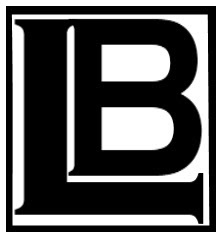
August 1, 2024
At long last—LB’s August Newsletter!
Really, LB? A newsletter? After all these years?
Not years, although it does seem that way. But months, and more than a few of them. People keep signing up for the newsletter, and the indispensable David Trevor keeps entering their data and sending them cheerful acknowledgments, and that’s all that happens. They probably wonder what’s amiss.
I wonder myself.
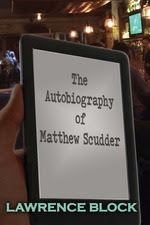 Well, I would appear to have retired. I wrote two books in 2022, The Burglar Who Met Fredric Brown and The Autobiography of Matthew Scudder, and I was more than happy with both of them, but once they were polished and published, I realized that I was done. I’d spent well over sixty years as a professional writer, and I’m grateful for every day I was able to devote to writing and every book and story I had the good fortune to produce, but that stage of my life was now over. In recent years I’d often suspected that I might be ready to wrap it up, and each time I’d found out I was mistaken, but this was categorically different; for the first time I no longer had the feeling that writing was what I ought to be doing.
Well, I would appear to have retired. I wrote two books in 2022, The Burglar Who Met Fredric Brown and The Autobiography of Matthew Scudder, and I was more than happy with both of them, but once they were polished and published, I realized that I was done. I’d spent well over sixty years as a professional writer, and I’m grateful for every day I was able to devote to writing and every book and story I had the good fortune to produce, but that stage of my life was now over. In recent years I’d often suspected that I might be ready to wrap it up, and each time I’d found out I was mistaken, but this was categorically different; for the first time I no longer had the feeling that writing was what I ought to be doing.
But if a really great idea came along—
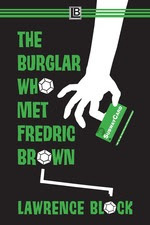 Ideas come along all the time. So what? I feel no obligation to entertain them, let alone act on them.
Ideas come along all the time. So what? I feel no obligation to entertain them, let alone act on them.
You’re really done.
So it would seem. I turned 86 last month. That’s the atomic number of radon.
I didn’t know that.
Neither did I. Happily, Google did. It’s also high enough as a human age that one is not hugely surprised when a person claiming it is retired. It’s miracle enough that the old boy is alive at all.
Um…
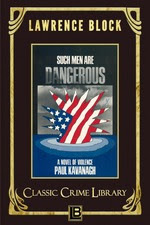 Never mind. Not writing, and not moping around thinking I ought to be writing, gives me time and energy for other pursuits. I’ve become something of a geriatric gym rat, picking up heavy metal objects and putting them back where I found them. I walk far enough and briskly enough to leave my Fitbit short of breath. I take naps, I listen to music, I watch Nature and Nova and Jeopardy.
Never mind. Not writing, and not moping around thinking I ought to be writing, gives me time and energy for other pursuits. I’ve become something of a geriatric gym rat, picking up heavy metal objects and putting them back where I found them. I walk far enough and briskly enough to leave my Fitbit short of breath. I take naps, I listen to music, I watch Nature and Nova and Jeopardy.
And, of course, I devote a certain amount of time to the business of being a writer.
Huh? Hang on, will you? I’ve always been given to understand that the business of being a writer consists of sitting down and writing something.
You know, back in the day that was pretty much all there was to it. For years the only writing-related activity that occupied me was thinking up 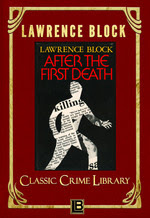 books and stories and giving my typewriter a workout. Whatever I wrote went to my agent du jour, and he did what he could with it and sent me the rewards of my labors. No book tours. No media, social or otherwise. I did spend a lot of time hanging out with other writers, but that’s who my friends were. God knows we weren’t networking. I can’t recall anyone using the work network as a verb. There were three networks, and not one of them knew that my fellow writers and I were alive. Which was fine, because we were all too busy to care.
books and stories and giving my typewriter a workout. Whatever I wrote went to my agent du jour, and he did what he could with it and sent me the rewards of my labors. No book tours. No media, social or otherwise. I did spend a lot of time hanging out with other writers, but that’s who my friends were. God knows we weren’t networking. I can’t recall anyone using the work network as a verb. There were three networks, and not one of them knew that my fellow writers and I were alive. Which was fine, because we were all too busy to care.
So you’re still running around on book tours, and doing podcasts, and hustling for Likes on Instagram and TikTok…
No, none of that. I’m retired.
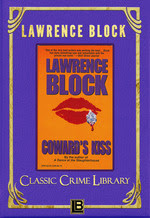 But—
But—
But I’m the self-publisher of many of my books, and the income they continue to generate helps keep me from having to run through what’s left of my daughters’ eventual inheritance. This doesn’t take a lot of time or effort, but it does seat me at the computer more days than not, and occasionally a project pops up that requires more than day-to-day attention.
Ping!
Ping?
The penny just dropped. That’s where you’re going, and it explains this newsletter’s title and the parade of covers on the righthand side of the page. You’ve done something with the Classic Crime 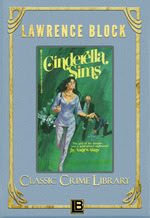 Library. Why don’t you tell us about it, and while you’re at it you can cop to the fact that the CCL is just a sneaky way to make a lot of old books look as though they’ve got something in common.
Library. Why don’t you tell us about it, and while you’re at it you can cop to the fact that the CCL is just a sneaky way to make a lot of old books look as though they’ve got something in common.
That’s a little harsh, but there’s some truth in it. The Classic Crime Library contains 21 non-series novels of mine, all of them nestled snugly beneath the broad canopy of crime fiction. The earliest titles first saw print in 1961, and all had been initially published by 1974 (except for one outlier, Ariel, which came out in 1980.)
A mere child of forty-four summers.
A virtual toddler. The CCL titles don’t have much in common beyond my authorship and their crime fiction credentials. Three of them were 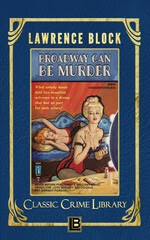 commissioned by paperback publishers at “TV tie-in novels,” original works of fiction based on the characters and background of an existing television drama. (Coward’s Kiss was based on “Markham,” starring Ray Milland; it turned out well enough that my agent had me change the character’s name and sold it to Knox Burger at Fawcett Gold Medal; You Could Call It Murder was the replacement Markham novel I then had to write for Belmont; Broadway Can Be Murder was based on “Johnny Midnight,” starring Edmund O’Brien. Both series were canceled by the time the books came out. My good friend Gloria Mundy knows what that’s like.)
commissioned by paperback publishers at “TV tie-in novels,” original works of fiction based on the characters and background of an existing television drama. (Coward’s Kiss was based on “Markham,” starring Ray Milland; it turned out well enough that my agent had me change the character’s name and sold it to Knox Burger at Fawcett Gold Medal; You Could Call It Murder was the replacement Markham novel I then had to write for Belmont; Broadway Can Be Murder was based on “Johnny Midnight,” starring Edmund O’Brien. Both series were canceled by the time the books came out. My good friend Gloria Mundy knows what that’s like.)
A sick transit, eh?
You might say that. Two of those titles and several others appeared under my name. Three—Such Men Are Dangerous, The Triumph of Evil, and Not Comin’ Home to You—originally bore the pen name Paul Kavanagh. It’s hard to remember why.
Perhaps you were trying to avoid building a following.
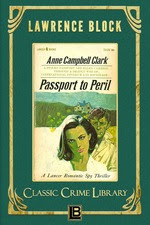 God knows I succeeded. Others started out with publishers of erotica—Beacon, Midwood Tower, Nightstand—and thus bore one or another of the pen names I used with those houses. For years I thought of them as Midcentury Erotica—
God knows I succeeded. Others started out with publishers of erotica—Beacon, Midwood Tower, Nightstand—and thus bore one or another of the pen names I used with those houses. For years I thought of them as Midcentury Erotica—
Not that there’s anything wrong with that.
—and eventually it dawned on me that they were crime novels.
And now they’re in the Classic Crime Library.
And happy to be there.
But what makes them newsworthy? Or should I say newsletter-worthy?
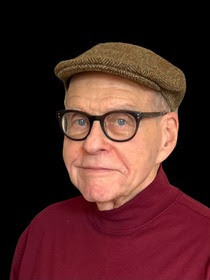 A couple of things. For one, Jaye Manus, my goddess of production and design, has given them a makeover. The front covers are essentially unchanged, typically featuring vintage cover art from an early edition, but the back covers now show an up-to-date author photo and a list of all twenty-one CCL titles.
A couple of things. For one, Jaye Manus, my goddess of production and design, has given them a makeover. The front covers are essentially unchanged, typically featuring vintage cover art from an early edition, but the back covers now show an up-to-date author photo and a list of all twenty-one CCL titles.
I like the photo. The credit line says Amy Jo Block took it.
She’s a talented young woman. Every CCL book is now available in three states: ebook, paperback, and hardcover. And pricing is uniform across the series. Ebooks are $7.99, paperbacks $11.99, and hardcovers $16.99. That represents a hike of a buck for most of the ebooks and paperbacks, but buyers of the hardcover editions are getting a significant break on the price.
 I can understand a higher price for the ebooks and paperbacks. Publishing costs have gone up, just like everything else. But the hardcovers used to cost $19.99 or $20.99, so you’ve actually reduced the price by three or four bucks a book. What gives?
I can understand a higher price for the ebooks and paperbacks. Publishing costs have gone up, just like everything else. But the hardcovers used to cost $19.99 or $20.99, so you’ve actually reduced the price by three or four bucks a book. What gives?
I’m really pleased with the look and durability of the hardcovers, in their handsome library bindings. I know some readers like to collect a full series, and hardcover editions have always been particularly collectible. These days I don’t collect anything but dust, but for most of my life I’ve been a passionate collector of one thing or another, so I’m temperamentally inclined to cut a fellow collector some slack. And please understand that I’m not being entirely altruistic here; if hardcover sales surge, I’ll come out ahead.
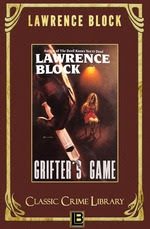 Let’s hope.
Let’s hope.
Indeed. I should note that seven of the books (Borderline, A Diet of Treacle, The Girl with the Long Green Heart, Grifter’s Game, Killing Castro, Lucky at Cards, and Sinner Man) continue to be available as Hard Case Crime paperbacks.
Love those Hard Case editions. I’ve got a bookcase full of them, and it looks great.
I’m sure it does.
But so do your CCL hardcovers. Do you think I’d be going overboard if I picked up those seven titles in paperback from Hard Case and in hardcover from your Classic Crime Library?
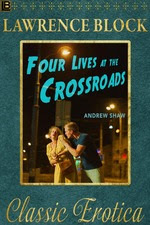 I think you’d be showing taste, refinement, and unparalleled good judgment.
I think you’d be showing taste, refinement, and unparalleled good judgment.
I’m not sure that’s how my accountant would see it.
Really? My wife’s an accountant, and she was quick to point out that, if you buy the entire Classic Crime Library in hardcover, the $3-4 a book you’ll be saving will let you grab up a whole bunch of Hard Case paperbacks. Her reasoning may be a little tricky to follow, but she’s got a whole closetful of shoes to show how well it works.
And here, to make it easy for all of y’all to demonstrate your own taste, refinement, and unparalleled good judgment, is a parade of links in alphabetical order:
After the First Death Ariel Borderline
Broadway Can Be Murder Candy Cinderella Sims
Coward’s Kiss Deadly Honeymoon A Diet of Treacle
Four Lives at the Crossroads The Girl with the Long Green Heart
Grifter’s Game Killing Castro Lucky at Cards
Not Comin’ Home to You Passport to Peril Sinner Man
The Specialists Such Men Are Dangerous
The Triumph of Evil You Could Call It Murder
These are early books, the most recent of them more than forty years old, and my inclination is, if not to apologize for them, at least to suggest that you take their age into asccount and cut them some slack. I prefer to believe that I’ve improved over the years, that my more recent work is a good cut above my earlier efforts.
That Matt Scudder’s a step or two ahead of Cinderella Sims?
Or at least that he’s playing in a tougher league. I like to think that’s true, and perhaps it is, but ultimately all such judgments are subjective, and the ultimate rule of criticism is Your Mileage May Vary. There are readers who think that my earliest work was my best work, that books like Grifter’s Game and Deadly Honeymoon have a raw vigor and urgency lacking in my later books. Who am I to say they’re wrong?
And I guess you think enough of them to bring them out in hardcover. Woud you ever do that with the Collection of Classic Erotica?
Hmm.
That’s your answer? Hmm?
I am, as Jack Benny so memorably said, thinking it over. There are well over thirty titles in the CCE, and a lot of people rolled their eyes when I saw fit to publish them in ebook and paperback. But a lot of other people seem to like the books. If hardcover sales of the Classic Crime Library are sufficiently encouraging, I’ll probably test the waters. We’ll see.
And that’s about enough for this long-overdue newsletter.
Cheers,

January 18, 2024
This just in—Old Dog Learns New Trick
The first surprise found me becoming for the first time an enthusiastic audiobook listener.
Now I’ve always respected the medium, and have even been a cheerleader for audio as I’ve watched it grow from severely abridged cassettes in truck stops to today’s world of universally available unabridged downloads. I was an audiobook narrator thirty years before I became an audiobook listener, and found the task at once demanding, exhausting— and hugely satisfying.
(And, back in the day, not without its amusements. Once, midway through a recording session for one of the Burglar books, the engineer/director, who’d only read the abridgement, asked for clarification. “Bernie seems like a regular guy,” he said, “and I gather Carolyn’s a nice-looking woman, so what I don’t get is how come he never puts the moves on her?” I asked if the abridgement had somehow deleted the information that she was a lesbian, and his jaw dropped. “You’re kidding. She’s gay???”)
My respect for audio increased when I saw it make books available to friends who had never been readers. One woman, for whom dyslexia had made the whole notion of reading for pleasure a contradiction in terms, got through a cross-country flight with a cassette of one of my Scudder books and landed wondering where this had been all her life.
So I’ve thought highly of audio, and was ever grateful to the voice artists who narrated my books and the enterprising chaps who published them. Indeed, when Audible’s ACX division made it possible to pair up with narrators and self-publish those works of mine that hadn’t interested mainstream audio publishers, I jumped right in. With both feet—I’ve brought out 45 titles in this fashion, and have had the pleasure of working with a dozen talented narrator-producers. I’ve even teamed up with a fellow in Germany who has been narrating and producing some translated editions.
The only thing I didn’t seem to do with audiobooks was listen to them.
I tried a few times, but it never worked. When I was driving, any verbal input that reached my ears came as an unwelcome distraction. If I was free to give an audiobook my full attention, it never seemed to hold it. My mind would wander, my eyes would glaze over, and my hand would reach for something to read. I concluded that I absorb information more effectively through my eyes than my ears, and that was fine with me.
Until it wasn’t.
Age has very likely had something to do with it. My eyes don’t work as well as they used to. (And why should they? Nothing else does.) And something has had its pernicious way with my attention span. Just as I used to interrupt audiobooks by picking up something to read, so do I now interrupt printed books by reaching for my iPhone.
I wondered if I might perhaps have aged into audio, even as I appeared to have aged out of optical reading. While I was thinking about this, I replaced my old hearing aids with a top-of-the-line pair. (How good are they? Well, walking home from Fourteenth Street, I was startled to hear a mouse fart in Philadelphia.) Among the improvements, a Bluetooth connection—whatever that is—enables me to play an audiobook on an app on my phone and have it beam directly into my ears.
Who knew?
And who knew that audio could enable me to give myself over entirely to an author whom I won’t name, and whose books I have never been able to read? He refuses to use quotation marks, and his punctuation in general is an exercise in self-indulgence, and a few other stylistic quirks have stopped me cold, and on one occasion led me to heave the arrogant bastard’s book across the room.
But, with a good narrator in charge, all of this disappears. Long story short—well, it may be too late for that—I enjoyed the book immensely over a period of several days, and emerged from it with my eyes in good shape and the strong sense that what I’d heard would stay with me. And just today, during a break from drafting what you’re reading now, I read a review in this morning’s New York Times, decided the book sounded interesting, booted up the app on my phone, downloaded the thing, and had a marvelous time listening to the first hour of it .
And my second new trick?
It’s part of the brave new world of Artificial Intelligence. I spent the greater part of my most recent newsletter discussing some aspects of AI, especially the foofaraw over its learning to write by reading whole shelves of books. (I found this reasonable enough; that, after all, is how I learned to write—by reading what others had written before me. Isn’t that how everybody learns to write?)
I don’t know what AI is going to amount to, or how to feel about it, and I have a hunch I share that ignorance with most of the world, not excepting those people who are devoting their lives to its development. But I don’t doubt for a moment that AI is going to be a massive game-changer, and just this month I’ve been getting a taste of how it’s already changing a game of which I myself have been a player.
Audiobooks. Specifically, self-published audiobooks.
As I mentioned, I’ve published 45 of the little darlings. Add in the several dozen titles available from commercial audio publishers and the total’s impressive, but it still doesn’t account for all the books I’ve perpetrated over the years. And, because ego and avarice have rendered me shameless, virtually all my pseudonymous early work is readily available in ebook and paperback form.
But not all of it was in audio. My audio self-publishing had essentially stopped during the pandemic, and I didn’t think the potential audience for the remaining titles justified the effort and expense that would be required of me and my narrator-producer partners. I’m an old man, my writing days are over, my energy and enthusiasm are limited—and just how desperately does the world need audio renditions of the sexological case histories of John Warren Wells or the erotic fictions of Andrew Shaw?
So what changed my mind?
You know, I have to think the first new trick, with the narrative voice of Tom Stechschulte resonating miraculously in my ears, must have made me take notice of an easy-to-ignore email about Audible’s Beta program. I’d been aware of it before, regarding it as a fascinating phenomenon without even considering my own participation therein. But this time around I gave it a second thought, and a few mouse clicks suggested it was something into which I could, without a great deal of trouble, dip a toe.
Within a couple of days, I’d clicked my mouse enough times to get the attention of its musical cousin in Philadelphia. And not without effect. Thirty-nine books of mine, previously destined to be silent for all eternity, are now Out There to be listened to.
Just. Like. That.
From the Collection of Classic Erotica: Butch, Circle of Sinners, College for Sinners, Community of Women, Flesh Mob, Flesh Parade, Girls on the Prowl, High School Sex Club, I Sell Love, Kept, Lust Weekend, Man for Rent, Passion Nightmare, Sex Takes a Holiday, Sexpot!, Sin Bum, Sin Master, Sin Time, The Sin-Damned, Trailer Trollop, Tramp, The Twisted Ones, and The Wife-Swappers.
By John Warren Wells: Come Fly With Us, Doing It!, Eros and Capricorn, Love at a Tender Age, The Male Hustler, Sex and the Stewardess, The Sex Therapists, Sex Without Strings, The New Sexual Underground, The Taboo Breakers, Tricks of the Trade, Versatile Ladies, and The Wife-Swap Report.
Finally (at least for the time being) a collection of short stories—Some Days You Get the Bear—and Afterthoughts Version 2.0, which the original publishers called “a must-read for Block fans and mystery lovers alike.” Easy for them to say…
And just how good or bad is the AI-generated narration? Hard for me to say, but here’s how a trusted associate reacted: “That is wild! The only thing that gives it away is some odd inflection, but after a little bit, even that stops standing out. I doubt this will kill jobs for voice actors, but it sure is amazing. Who knew?”
Well, I sure didn’t. If you’re eager to find out for yourself, it’s an easy itch to scratch. I’d thought about filling this newsletter with links, but decided to play the Old Man card and spare myself all that work. Just enter any title + Lawrence Block in the search engine at either Amazon or Audible. I’ve priced the AI-generated audiobooks at a low $9.99 apiece, and some may be free to Kinde Unlimited members; in any event, they’re as unlikely to impoverish you as they are to make me rich.
And will the new technology kill jobs for voice actors? I’m not so sure that it won’t. In the area of verbal composition, AI is already being widely used to create property descriptions for realtors; that’s a lower bar than the bestseller list, to be sure, but it’s saving a lot of time for a lot of real estate salespersons, many of whom may not be that verbally agile in the first place. By the same token, a lot of routine narration can be handed off to AI. If it saves time and effort, it’s gonna happen.
“Nobody knows anything.” That’s what William Goldman famously said of the film industry, and I think it applies at least as well to Artificial Intelligence. One of the few things I think I know about it is that it’s in its infancy, and indeed barely out of the womb. By the time you finish reading this newsletter, it will be a little bit further along than when you started, and I can’t begin to imagine what it’ll be like a year from now, or two years, or five. My best guess is that it will replace some voice actors, and some writers, and some translators—and, because creation flows alongside destruction in any successful technology, it will inevitably bring new jobs and new opportunities.
Unless it doesn’t.
But I’m just guessing, and what do I know? I’m going to wrap this up and listen to some more of my current audiobook. It’s a memoir, and it’s narrated quite capably by the woman who wrote it. I can only wonder which of her two jobs will be eliminated first…
Cheers,

PS: As always, please feel free to forward this to anyone you think might find it of interest. And, if you yourself have received the newsletter from a friend and would like your own subscription, that’s easily arranged; an email to lawbloc@gmail.com with LB’s Newsletter in the subject line will get the job done.
October 29, 2023
WHO’S AFRAID OF THE TWELVE-TOED SLOTH?
Okay, what in the world are you talking about?
I’m playing with words. You’re probably familiar with the acronym “AI”—capital A, capital I. Artificial intelligence.
So?
Well, the word “ai”—both letters lower case—turns up every second or third blue moon in crossword puzzles and Scrabble tournaments. It’s a three-toed sloth, Bradypus tridactylus, native to Venezuela and the Guianas, and its name comes from the high-pitched cry it emits when disturbed.
It cries out Bradypus tridactylus? Never mind. Bradypus tridactylus, aka ai, aka the three-toed sloth. But you just called it—
A twelve-toed sloth. I figure it’s only fair to count all of its toes, not just a single foot’s worth. One sloth equals four feet, three toes to a foot. You could, I suppose, call it the dozen-toed sloth.
So far I’ve never felt the need to call it anything at all. Nor have you, as far as I can make out. Why the sudden interest?
Well, I’ve been thinking about AI. The acronym, all caps. Artificial Intelligence. I’ve been trying to decide whether it’s redundant or oxymoronic. Is all intelligence by definition the product of artifice? Or, conversely, is the very phrase artificial intelligence a contradiction in terms?
What have you decided?
I’m leaving it open. But I’ve had to pay some attention to my own relationship with artificial intelligence, because I’ve only recently learned that I have one. A relationship, that is. I figured AI was something for more highly evolved people to worry about, while I confined myself to political upheaval and climate change.
The small stuff.
Exactly. But then a great hue and cry arose in my professional community. It seems that the published work of writers, whether or not protected by copyright, is being used to train Artificial Intelligence programs. With a mouse click or two, I could search data bases and determine whether the wily boffins of AI were exploiting any of my books in this manner.
And?
And I clicked away, and a slew of my titles, spanning the sixty-some years of my career, turned up on the screen. Whoever sponsored this site—it may have been Author’s Guild, it may have been somebody else—invited me to fill out a form and file an official protest against this unauthorized use of my work. So I did.
Good for you.
You think? I’m not so sure. Because just what is it that AI is doing? It’s reading my work, and the work of thousands of other writers, with the goal of improving its own writing ability. I thought about it, and here’s what I realized:
That’s exactly what I started doing back in the 1950s. I read hundreds of books, everything I could get my hands on, partly because reading was a source of pleasure, but also with the intention of becoming a writer myself, and learning my craft by reading the efforts of others.
I read and I wrote. And, after I’d sold a couple of stories to crime fiction magazines, I found a shop that sold back-date magazines for half the original cover price. I bought dozens of magazines, and I read hundreds of stories, and some of them were good and some of them were not, but in the course of a few months I managed to teach myself what a crime story was and how it worked.
I think you wrote about this in A Writer Prepares. You analyzed them, eh?
No, all I did was read them. The process was more one of absorption and internalization than anything analytical or intellectual. All I know is it worked, and most writers I know went through some version of this process. Almost all of us were eager readers before we were writers, and our reading fed and nourished our writing.
Now I don’t recall ever deliberately setting out to write like anybody. But there’s no question in my mind that my exposure to the work of other writers formed me as a writer and enabled me in time to find my own voice. It helped me to read the work of writers I respected and enjoyed, but it helped me as much—and possibly more—to read the work of inferior writers.
You definitely wrote about that in A Writer Prepares. Working for Scott Meredith, reading stories from wannabes—
Many of whom couldn’t write their names in the dirt with a stick. Those were, as they say, the days. Never mind. The point is that I learned to write the way almost everybody learns to write.
By reading and writing.
Uh-huh. After a day at Scott Meredith, I’d walk a block east on 47th Street to the old Mercantile Library, where I’d borrow half a dozen books by people like Fredric Brown and David Alexander and Peter Cheyney and William Campbell Gault. I’d go home to my hotel apartment at Broadway and 103rd and I’d spend the evening reading or writing. Or both.
Now the dozens upon dozens of writers I read didn’t know they were furthering my education. They didn’t even know I existed. I certainly wasn’t putting food on their tables; neither libraries nor secondhand bookstores were in the business of paying royalties.
So would they feel exploited for having unwittingly schooled me? I rather doubt it. Over the years, any number of younger writers have told me that I contributed to their professional education in much the same manner, that books of mine had played a role in their development as writers; my response is never that they owe me money, or even gratitude.
So why should I get all in a huff when some AI developer tucks some works of mine into his syllabus? Because he’s not paying me? Well, why on earth should he? I wrote this stuff in the hope that it would be read, and it’s enormously satisfying to me that, through the miracle of ebooks and POD paperbacks, virtually everything I ever wrote is still available. I don’t delude myself with the notion that my work will last much past my lifetime—Spoiler Alert, nobody’s will—but it’s out there now, and that pleases me.
But isn’t it all part of a larger issue? Isn’t Artificial Intelligence shaping up as a threat to writers?
Probably. Every innovation puts some people to work and others out of it. I don’t know what the long-term effects of AI will be on the vocational landscape, and I suspect I’m by no means alone in my ignorance. Time will tell, and not everyone will be happy with what it has to say. Consider the enterprising chaps who make a living selling theses and term papers to indolent college students. They’ll all be out of work once their customers learn to outsource everything to ChatGPT.
But mine is ostensibly creative work, the output of my personal organic imagination. Could AI do it as well as I?
Well, how the hell should I know? Back in the days when I turned out reams of what we’re now pleased to call Midcentury Erotica for Bill Hamling and Harry Shorten, my colleagues and I transformed more than a few wannabes into ghostwriters, most of whom went on to have actual careers. The medium was a remarkably forgiving one, and we took these people and taught them how to write for it.
Didn’t you once say that it was only the lack of an opposable thumb that kept your average chimpanzee from doing the work?
Maybe. It sounds like something I might have said. And one of these days I suppose a twelve-toed sloth will take the words right out of my mouth.
#
Um…is that it? Aren’t you going to crow about some great reviews? Announce some forthcoming projects? Tell us all what to buy? This is your first newsletter in months, and there’s no news in it.
I know. I published two books in the past twelve months, The Burglar Who Met Fredric Brown last fall and The Autobiography of Matthew Scudder in June, and both were very generously received and are selling well. I haven’t written anything since then and can’t say I feel the urge to do so.
There are two audiobook special sales of which y’all might want to take advantage. The Specialists is a relatively early crime novel of mine, the projected first volume in a series for which I never wrote a sequel. Fred Sullivan narrates it skillfully, and the $4.99 price is a steep discount from $19.99. Alas, I should have told you about this sooner, as the offer pumpkins out at the end of October—but if you opened this newsletter right away you still have time.
And the numbers are just about the same on this offer for the audiobook of The Burglar Who Met Fredric Brown, superbly voiced by the late Voice of Bernie Rhodenbarr, Richard Ferrone. List price is $19.99, but you can grab it for an even five bucks. (And you have until November 10 to do so.)
There you go. Not much news, but a couple of good deals, and more words overall than I’ve written in months. I figure that’s enough. Enjoy what’s left of autumn. And brace yourselves; they tell me winter’s coming.
Cheers,

June 22, 2023
D-Day Minus Two!
Right.
I reminded him this morning, not for the first time. He used a couple of words you might find in The New Yorker but not in The New York Times. Not yet, anyway. Then he said, “You do it.”
The time frame right now is such that it’s more important to get this done than to get it done right, so here goes.
1. The Autobiography of Matthew Scudder releases on Saturday, June 24, the day after tomorrow as I write this. If you’ve put off preordering out of a fear of commitment, well, at this late date it’s only technically a preorder, and will guarantee ASAP delivery of ebook or paperback:
AMAZON BARNES & NOBLE KOBO APPLE
THALIA SMASHWORDS VIVLIO
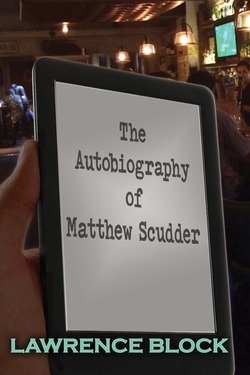 2. Just hours from now, which is to say at 6pm on Thursday, June 22, LB will be making his only public appearance for the book at The Mysterious Bookshop at 58 Warren Street in Lower Manhattan. It’s a little late to urge you to drop everything and hurry to the bookshop, but if you want a signed copy of TAOMS, that’s the only place you’re going to be able to get it…and their stock is pretty close to exhausted. You can click the link and order online, but if signatures really matter to you, I’d suggest a phone call to 212.587.1011.
2. Just hours from now, which is to say at 6pm on Thursday, June 22, LB will be making his only public appearance for the book at The Mysterious Bookshop at 58 Warren Street in Lower Manhattan. It’s a little late to urge you to drop everything and hurry to the bookshop, but if you want a signed copy of TAOMS, that’s the only place you’re going to be able to get it…and their stock is pretty close to exhausted. You can click the link and order online, but if signatures really matter to you, I’d suggest a phone call to 212.587.1011.
3. LB was planning to pack this with email with quotes and reviews, but I grabbed a few for the Amazon order page, and time’s running out, so I’m making an executive decision and saying the hell with it. Here’s an extract, though, from Vick Mickunas’s terrific review in the Dayton Daily News:
“This is Scudder’s back story; where he was born, what his family was like, how he became a cop, a detective, and also, an alcoholic. To this reviewer the most fascinating bits in this story revolved around how Scudder became a police officer. We meet his partner, an older cop who demonstrates how he thinks policing should work, the occasional bribe notwithstanding. And we get to see how Scudder washed out of the force to become the private investigator Block has been writing about for half a century. Devotees of the Scudder books will not want to miss this one. If you have never experienced any of the stories in this series I think after you read this autobiography you’ll be intrigued to comprehend there are another 19 Scudder books already out there just waiting for you to devour them.” ~Vick Mickunas, Dayton Daily News
4. I should also mention the audiobook. Peter Berkrot reads Scudder, Romy Nordlinger reads Elaine, and LB appears briefly as, um, himself. Same June 24 release date.
Okay, that’s gonna have to do it. Whatever I’ve misspelled or gotten wrong or left out altogether is something we’ll all have to live with. And here, in case you missed it, are the links once again for TAOMS:
AMAZON BARNES & NOBLE KOBO APPLE
THALIA SMASHWORDS VIVLIO
Cheers,
David Trevor sitting in for

PS: As always, please feel free to forward this to anyone you think might find it of interest. And, if you yourself have received the newsletter from a friend and would like your own subscription, that’s easily arranged; an email to lawbloc@gmail.com with LB’s Newsletter in the subject line will get the job done.
LB’s Blog and Website
LB’s Facebook Page
Twitter: @LawrenceBlock
June 13, 2023
WHO’S THAT KNOCKING ON MY DOOR?
Whoever it is, tell ’em to come back with a warrant.
Now what kind of an attitude is that? Well, maybe you’ll change it when I answer the question. That’s Opportunity knocking, and she’s got places to go and people to see. You might want to put down your phone for a minute and open the door.
Ah, a sales pitch. I should have known. Okay, let’s hear it.
Well, if you insist. As you may know, 2022 was a surprisingly productive year for me. I sat down at my desk in January, and ten months later I’d completed two full-length books, The Burglar Who Met Fredric Brown and The Autobiography of Matthew Scudder. I settled on the same publishing approach for both books—self-publication in ebook and paperback form, and deluxe signed-and-limited hardcover editions from my good friends at Subterranean Press.
The Burglar Who Met Fredric Brown has been available since last October in ebook and paperback and audio. Its reception is everything Bernie or I could have hoped for—
Except for a handful of one-star reviews from readers who couldn’t get their minds around the notion of a parallel universe.
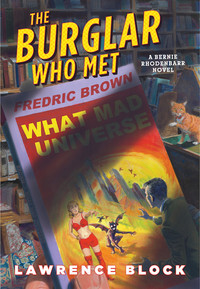 It’s hard to figure, don’t you think? They’re fine with Bernie and Carolyn staying the same age for the past forty years, but the idea that he could wake up in a world with no security cameras or online booksellers is just too science-fictional for them. Never mind—the book’s selling well, and just look at Chuck Pyle’s cover for Subterranean’s edition.
It’s hard to figure, don’t you think? They’re fine with Bernie and Carolyn staying the same age for the past forty years, but the idea that he could wake up in a world with no security cameras or online booksellers is just too science-fictional for them. Never mind—the book’s selling well, and just look at Chuck Pyle’s cover for Subterranean’s edition.
Wow!
My reaction exactly. They’re offering the book in two states, a deluxe hardcover limited to 750 signed-and-numbered copies and priced at $60, and a super-deluxe collector’s edition, limited to 15 signed-and-lettered copies, bradel-bound and housed in a custom traycase.
I bet that one’s more than $60.
It’s $750, which is more than I generally spend on a book. As a matter of fact, there was a time when that’s the total amount I got for writing one. But that was a while ago, in an age when I couldn’t have used Google to find out what bradel-bound means—though it certainly sounds like something that could befall a character in one of the books I was writing back in the day.
“He saw her in the corner of the room, buxom and bradel-bound, her expression hovering somewhere between arousal and terror…”
That sounds about right. As for the lettered edition, there are only fifteen of them—
Which leaves eleven letters unaccounted for.
—and if you want one, well, it might be a mistake to dawdle.
I’m afraid financial considerations doom me to be forever among the dawdlers. Although were I to wake up in the right sort of parallel universe…
And who’s to say it couldn’t happen? Numbered @ $60 or lettered @ $750, the Subterranean editions are now available for pre-order prior to October publication.
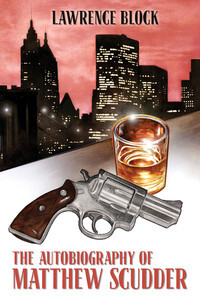 But let’s move on to Subterranean’s The Autobiography of Matthew Scudder. This one’s got a handsome cover of its own—by John K. Snyder III.
But let’s move on to Subterranean’s The Autobiography of Matthew Scudder. This one’s got a handsome cover of its own—by John K. Snyder III.
I know that name.
I’m not surprised. John—or JKS3—is renowned in the world of comic books and graphic novels, and knocked my argyles off with his graphic novel adaptation of Eight Million Ways to Die. He also supplied a cover and interior illustration for Subterranean’s edition of The Night and the Music.
And now, happily, I can save all of us a little time. Because, while The Autobiography of Matthew Scudder gets its own preorder page on the Subterranean site, I can tell you that the specs are essentially the same. Two limited editions—750 signed-and-numbered @ $60, 15 signed-and-lettered @ $750.
And the release date will be in October? Same as Fredric Brown?
That’s the plan.
And a reasonable plan, I have to admit. Still, 15-copy lettered editions don’t go very far, and 750-copy numbered editions don’t stretch a whole lot farther. But there’s no limit at all on the ebook and paperback editions, priced at $9.99 and 17.99 respectably—
I think you mean respectively.
Whichever. They’re where you’re going to make most of your sales, and their release date is just over a week from now, not months away in far-off October. Why aren’t you pitching them?
That’ll be in the next newsletter.
What, six weeks from now?
No, a matter of days, and—
How many of them? I mean, even the Hundred Years War was a matter of days. Why are you looking at me like that?
Why am I looking at you at all? Never mind. The Subterranean Press editions are limited, and I want to get the word out ASAP so that any reader who wants one has a fair chance. The ebook and paperback, which will release on June 24, are already getting preordered at a heartening rate, and I want to be able to include a decent representation of the advance reviews that have been streaming in. So it’ll take a couple of days, but nobody really needs to wait for the newsletter to preorder, and here are the links, to make it as easy as possible:
AMAZON BARNES & NOBLE KOBO APPLE
THALIA SMASHWORDS VIVLIO
And that’s it for now.
Cheers,

PS: As always, please feel free to forward this to anyone you think might find it of interest. And, if you yourself have received the newsletter from a friend and would like your own subscription, that’s easily arranged; an email to lawbloc@gmail.com with LB’s Newsletter in the subject line will get the job done.
May 27, 2023
Oops!
Here’s the link, missing at the end of the Naked & Deadly Introduction blog post:
A Naked and Deadly Introduction
As many of you may know, just about everything I’ve written, in a lifetime in which I’ve written far too much, is now once again available, much of it through the miracle of ebooks and print-on-demand paperbacks. The passing years have seen Ego and Avarice gain in influence, perhaps at the expense of Self-Respect. In 2020, Terry Zobeck brought out A Trawl Among the Shelves, his exhaustive bibliography of my work—and just about every item he lists is, for better or for worse, readily obtainable.
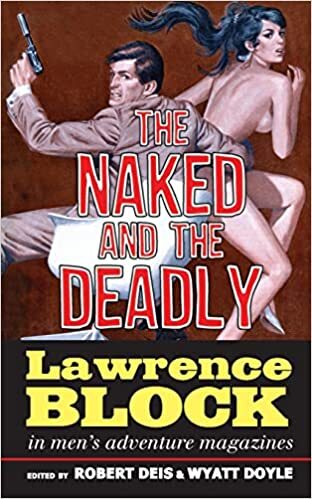 That was not true of a batch of articles I’d written at the very beginning of my career for the men’s adventure magazines. But then along came Robert Deis and Wyatt Doyle, whose particular enthusiasm is those hairy-chested publications of yesteryear. What, they wondered, would I say to a handsome volume collecting all my contributions to that magazine genre, including not only the nonfiction pieces written to order but the various short stories and book excerpts that one or another of the magazines had reprinted.
That was not true of a batch of articles I’d written at the very beginning of my career for the men’s adventure magazines. But then along came Robert Deis and Wyatt Doyle, whose particular enthusiasm is those hairy-chested publications of yesteryear. What, they wondered, would I say to a handsome volume collecting all my contributions to that magazine genre, including not only the nonfiction pieces written to order but the various short stories and book excerpts that one or another of the magazines had reprinted.
What would I say? Well, the first thing I said was “What’s in it for me?” The next thing I said was “Yeah, sure, I guess so. Why not?”
And would I be so good as to provide an introduction?
Um…yeah, sure, I guess so. Why not?
So here’s the introduction. If you enjoy it, all well and good. If you decide you want to read the book, you can order it easily enough in paperback or hardcover. At their own site, Bob and Wyatt also offer a signed limited edition for a few dollars more…
###
A NAKED AND DEADLY INTRODUCTION
For five bucks a week, I chose Scott Meredith over Henry Luce.
Well, in a manner of speaking. It was the summer of 1957. After spending the month of July on Cape Cod, where I wrote a batch of short stories before hunger prompted me to take a horrible job in a restaurant, I quit and headed back to my parents’ house in Buffalo. I’d bought my first car, a 1953 Buick, in order to drive to the Cape, and I cracked it up en route to Buffalo, where I sold it and got on a train to New York. I found a furnished room on East 19th Street and set about looking for a job.
I had turned 19 in June, and had completed two years at Antioch College. Antioch had (and still has) a work-study program; students spend about half their time on campus and the other half getting real-life experience in jobs in their field. My first co-op job had been a year earlier, at Pines Publications, publishers of the Popular Library paperback line and a great array of magazines. I’d spent three months in the mail room, which gave me practical experience as a clerk and gofer, neither of which much appealed to me as a career choice. But Pines was a publishing company, and I knew I wanted to be a writer, and that wasn’t the worst place to start.
Two months in, the fellow in charge of promotion and publicity told me his assistant was leaving at the end of the month, and wondered if I’d like to take his place. When I admitted I was scheduled to return to college, he assured me I should stick with my plans—and I did, but not without some reluctance. I liked school well enough, but from the jump I was impatient to Get Out There and Do Something.
What I did in August was look for something to do—and, back in Buffalo, my folks tried to lend a helping hand. Ralph Tolleris, a fraternity brother of my dad’s at Cornell, was married to a woman who did something significant at Time-Life, and eventually she and I spoke over the phone. I’d spent a week responding to classified ads, and figured I’d be able to get an office job that would pay me $65 a week. Beebe Tolleris was able to offer me a job as a copy boy at Time Magazine. I’d work 9 to 5, Wednesdays through Sundays, with Monday and Tuesday off, and I’d make $60 a week.
I said I thought I’d keep looking.
Now it wasn’t the five pre-tax dollars a week, not really. It was a deep disinclination to take a job through family connections, because what if I screwed up? What if I got fired? And so on. And yes, a path to success often started as a copy boy at Time, much as careers in the film business began in the mailroom at William Morris, but on the first of November I’d be back on campus in Yellow Springs, Ohio, so what was a menial job at Time going to do for me?
Next thing I knew I’d taken a test and landed a position as an editorial associate at the Scott Meredith Literary Agency. There’s an interesting story that goes with it, but I tell it at length in A Writer Prepares, where you can find it at leisure. I got the job—and yes, the base pay was $65 a week, and if you exceeded your quota you could bring in ten or twenty dollars over that figure.
But that was the least of it. I had fallen into what I have never ceased to believe was the best possible job for anyone with career aspirations in any area of writing or publishing. By the time August had given way to September, as it so often does, I knew I wasn’t going back to Antioch, not in November and very likely not ever. It was a good school and they had a lot to teach me, but I was already in the right place to learn what I really wanted to know.
I was at my desk at 580 Fifth Avenue five days a week, reading the stories of wannabe writers who paid Scott to read their work. They didn’t get Scott, they got me or one of my colleagues, and it was our job to read their stories and tell them why they were unsalable, but that we’d welcome more submissions—each, of course, accompanied by the requisite fee. I’d do that until five o’clock, and then I’d go home and write stories of my own. I’d bring these to the office and give them to Henry Morrison, and he’d read them and send them to one editor or another, and most of the time they’d sell for a cent a word, sometimes a cent and a half, bringing me something like thirty or forty or fifty or sixty dollars—but the money wasn’t the point. I was writing fiction! I was selling it, and it was getting published!
In addition to the stories I wrote of my own initiative, sometimes an editor would call the office with an assignment. He needed 2500 words to fill a hole in an issue that was about to go to press, say, or he had a terrific idea and needed someone to write it up. A shipwreck, or a disaster, or a Very Bad Man—generally something it would never occur to me to write, but more often than not an occasion to which I was prepared to rise.
A fellow named Ted Hecht, at a company called Stanley Publications, was the source of most of these assignments. The Scott Meredith offices were at Fifth Avenue and 47th Street, and the New York Public Library was five short blocks to the south, and I would walk there and consult the card catalog and fill out a slip to request a couple of books, and read enough to go home and write an article. That’s how most of these articles came about.
But not quite all of them. The first one you’ll find is “Queen of the Clipper Ships,” and the byline is Sheldon Lord, the name I used on most of these pieces. But the article itself, I assure you, is one I read for the first time in a pre-publication PDF of this very book. I’d never seen it before, and I certainly never wrote it.
Now I’m unquestionably getting on in years. If I was 19 in 1957, well, you can do the math. And my memory has aged along with the rest of me, and it’s among the component parts thereof that no longer function as well as they once did. There are things I don’t remember all that clearly, and others I recall imperfectly. But in this instance I can say with absolute certainty that “Queen of the Clipper Ships” is not my work. It’s listed in Terry Zobeck’s bibliography of my work, A Trawl Among the Shelves, because anyone encountering it with Sheldon Lord’s byline on it would certainly assume it was mine. I thought as much myself, until I finally took an actual look at
But it’s not.
So who wrote it, only to have Ted Hecht hang someone else’s pen name on it? I’ve no idea, and I suspect anyone who ever might have known has long since spiraled on to another incarnation. You’ll note that it appears in the same issue with another shipwreck story, the General Slocum disaster, and slapping the same byline on both pieces is the sort of thing that can happen when an editor’s in enough of a hurry to get copy to the printer. But never mind. I got $75 for “The Greatest Ship Disaster in American History,” and I can but presume that the actual author of “Queen of the Clipper Ships” got as much for what he wrote, and that it didn’t pain him too much to see the credit go to somebody else.
And now I’m comfortable enough seeing it here in this volume, helping to add a little heft to the book, perhaps making it that much more rewarding an experience for You the Reader. Did I write it? Well, no, but here it is, in my book, still wearing my longstanding pen name. So I think we can safely say it’s mine. And, should anyone reading this be seized by the urge to reprint this stirring tale, my response would be the same as if you expressed similar interest in any of the book’s other contents. I am, after all, a reasonable man. I’ll listen to offers.
Ah yes. I learned a great deal from Scott Meredith…
#
Besides the articles—which, I have to say, would be much easier to write now, in the era of Google and Wikipedia—you’ll find some of my early fiction in this volume. There are in fact three novelettes that feature a New York-based private detective named Ed London.
His origins are complex, and perhaps interesting. I left my job at Scott Meredith after a little less than a year, arranged to return to Antioch in the fall of 1958, and in the interim went home to Buffalo and wrote my first novel. (It’s in print now as Shadows, by Lawrence Block writing as Jill Emerson; it was initially published in 1959 with a different title and pen name.) By the time I was back in Yellow Springs, I’d begun writing erotic novels for Midwood Books as—yes—Sheldon Lord, and one way or another I wrote and drank and smoked my way out of Ohio by the end of that none-too-academic year. I wound up, first in Buffalo and then in New York, making a living by writing novels.
Henry at Scott Meredith was still my agent, and the occasional source of an assignment. One was a TV tie-in novel, a book to be published as a paperback original and capitalizing on a television show, in this case one called Markham and starring Ray Milland. (This was not a novelization, which would consist of turning an existing dramatic script into a prose novel; I was to take the character Ray Milland played and come up with my own story for him.)
By the time I’d finished the book, I wondered if it might be too good to sell to the low-rent house that had commissioned it. I showed it to my friend Don Westlake, who encouraged me to show it to Henry, who sent it to Knox Burger at Gold Medal, who’d already bought my first crime novel. (Mona, later retitled Grifter’s Game.) Knox asked for some fixes, including changing the hero’s name from Roy Markham. I picked Ed London, and made the other changes he wanted, and Gold Medal brought it out as Death Pulls a Doublecross. (And later it became Coward’s Kiss. Plus c’est la même chose, dontcha know.)
But then I owed a book to Belmont, a book starring Roy Markham. So I had to write it, and, well, never mind. I did what I had to do, and by then Ray Milland’s show was canceled anyway, but Belmont published it as Markham and I’ve since republished it as You Could Call It Murder.
So there I was, with a guy named Ed London who could go on to star in a series of Private Eye novels, if only I could write them. And I tried, but it never worked. I don’t know why. What I did manage to write was a novelette, and it sold to Man’s Magazine. That was a decent sale to a decent market, and in the ensuing months I managed two more Ed London novelettes, and they went to the same place. And that was as much as I ever had to say about Ed London—except for all the times I’ve recounted this story, which may well add up to more words (if to no more purpose) than all three novelettes and the novel itself.
#
And what else have we here?
“Just Window Shopping” is an early crime story, and probably one that failed to sell to one of my regular penny-a-word markets; someone evidently dug it out and sent to Man’s, and it landed there. “Great Istanbul Gold Grab” and “Bring On the Girls” are extracts from The Thief Who Couldn’t Sleep and The Scoreless Thai, both novels in my Evan Tanner series. “Erotic Life of the ‘Fly Me’ Stewardesses” is an extract from “Sex and the Stewardess,” one of far too many purportedly factual books I wrote as John Warren Wells.
And there you have it. Naked? Yeah, pretty much. Deadly? You betcha.
And by Lawrence Block?
Well, mostly…
May 2, 2023
WHAT’S A META FOR???
Oh, word play. How clever.
And how perceptive of you to spot it. But let me move past the pleasantries, if that’s what they are, and get right to the news. Once that’s out of our way, I’ve another item that might make the headline a little more pertinent.
First, though, consider the following items, which I’ve numbered in an effort to provide the illusion of order in our disorderly universe:
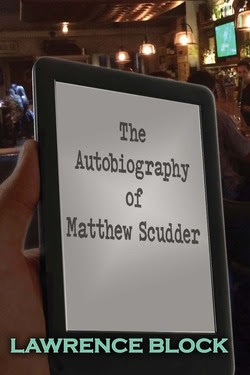 1— It is now possible to preorder both the paperback and the ebook of The Autobiography of Matthew Scudder from Amazon. As the indispensable David Trevor reported in “The Scudder Capstone,” an internal glitch at Amazon hid the paperback listing, while the ebook was very much available for preorder. All is well now, as many of you have evidently discovered for yourselves. The paperback can also be preordered from Barnes & Noble; the ebook is widely available from online retailers.
1— It is now possible to preorder both the paperback and the ebook of The Autobiography of Matthew Scudder from Amazon. As the indispensable David Trevor reported in “The Scudder Capstone,” an internal glitch at Amazon hid the paperback listing, while the ebook was very much available for preorder. All is well now, as many of you have evidently discovered for yourselves. The paperback can also be preordered from Barnes & Noble; the ebook is widely available from online retailers.
2— If you want a signed paperback of TAOMS, there’s only one source; fortunately, you can lock down your autographed copy now at the $17.99 list price from The Mysterious Bookshop.
3— I haven’t done a store appearance in years, but I’ll be launching TAOMS on Thursday June 22, at The Mysterious Bookshop. I may read a bit of it, if only to prove that I still can, and I’ll probably talk some, and then I’ll write my own name over and over, and when there are no more books to sign we can all go home. The bookshop, as you may know, is located at 58 Warren Street in Lower Manhattan, and the evening is scheduled to get underway at 6pm.
4— The only other way to get a signed copy is to spring for Subterranean Press’s deluxe signed-and-numbered hardcover edition. It’s scheduled for publication in the fall, along with their premium edition of The Burglar Who Met Fredric Brown, and when we know more, David or I will fill you in.
5— Dreamscape’s TAOMS audiobook should be outstanding. It’s a joint venture of three voices, although almost all of the workload winds 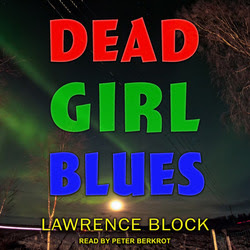 up on the capable shoulders of Peter Berkrot, whose task it is to give voice to the book’s narrator, Matthew Scudder. In an extended dialogue sequence, Romy Nordlinger supplies Elaine; I read the short opening section, and another couple of paragraphs later on—as, um, “Lawrence Block.” (I haven’t yet heard the audiobook, but know I can recommend it with confidence; Peter’s done quite a few books of mine, most recently Dead Girl Blues and A Writer Prepares.)
up on the capable shoulders of Peter Berkrot, whose task it is to give voice to the book’s narrator, Matthew Scudder. In an extended dialogue sequence, Romy Nordlinger supplies Elaine; I read the short opening section, and another couple of paragraphs later on—as, um, “Lawrence Block.” (I haven’t yet heard the audiobook, but know I can recommend it with confidence; Peter’s done quite a few books of mine, most recently Dead Girl Blues and A Writer Prepares.)
6— Most of you, I suspect, will be most comfortable with The Autobiography of Matthew Scudder, whether in hardcover or paperback or ebook or audio. But some of you may prefer Die Autobiographie von Matthew Scudder, while others might find L’Autobiografia di Matthew Scudder more accessible. It’s my pleasure to advise you that Sepp Leeb and Luigi Garlaschelli have supplied the German and Italian translations, and that we’ll have both on sale on June 24. (And, even as I type these lines, the German version has just become available for preorder.)
Hmm. I could swear there was something else. What was it?
You were going to explain the title, remember? “What’s a meta for?”
Oh, right. In The Scudder Capstone, David quoted a pair of very heartening reviews by James Reasoner and Dan Schwent. Since then, Vince Keenan has posted a generous review on his website, and David Morrell, a dear friend and the author of Murder as a Fine Art, supplied a blurb—and something more.
You can follow the link to Vince’s full review, but let me give you a taste of it:
“This latest book is exactly what the title promises: a fictional character telling you his life story. For devoted readers (like me), there’s an element of pure wish fulfillment at play. The book is essentially a chance to tug the sleeve of a character we’ve gotten to know quite well and offer to buy him another cup of coffee before he heads out, to hear an additional story or two and ask questions long wondered about. It’s an impressive trick that requires decades of work on the part of both writer and reader to carry off. You need to know Matt Scudder in order to appreciate this book, and if you know Matt Scudder you’ve already ordered it.”
David Morrell’s blurb will show up soon on the book’s online product pages, and it’s a honey, but here’s what he added separately, with a note inviting me to use it if I wanted:
“I always knew that Lawrence Block was among the most compelling and skillful of crime novelists. Now I discover that he’s also a brilliant meta novelist, in the tradition of John Barth and Jorge Luis Borges. In THE AUTOBIOGRAPHY OF MATTHEW SCUDDER, Block’s popular private-investigator character tells us about the events (some of them poignant, others heartbreaking, and several of them violent) that inspired 17 novels, numerous short stories, and 2 movies about him.
“The suggestion is that Scudder is a real person who confided in Block and allowed Block to invent fictional versions of events in Scudder’s life. Now Scudder nudges Block aside, faces the keyboard, and tells the real story behind the stories about him. The first-person confessional tone is convincing, not to mention fascinating.
“But I couldn’t help thinking of THE AUTOBIOGRAPHY OF MATTHEW SCUDDER as an example of how characters can become so real for a novelist that they assume control. I imagined Block approaching his desk each day and turning into Matthew Scudder yet again, channeling a character who occupied his imagination for 49 years and now perhaps for the last time. A valediction as much as a fictional autobiography. A fascinating example of how author and character become one. That meta layer in this terrific book made me admire it even more.”
In addition to having given Rambo to the world (and not incidentally to Sylvester Stallone), David earned the right to drop those names— he wrote a critical study of John Barth’s work and taught Borges in his Modern Fiction course at the University of Iowa. “When it comes to meta,” he confided, “I learned from the masters.”
Got it. You know, you could go a step further and quote Will Rogers. Remember? He said he never meta man he didn’t like.
I wouldn’t dream of it. In fact, it seems to me I’ve said enough. Be well, all of y’all, and enjoy the month of May. That’s what it’s there for.
Cheers,

PS: As always, please feel free to forward this to anyone you think might find it of interest. And, if you yourself have received the newsletter from a friend and would like your own subscription, that’s easily arranged; an email to lawbloc@gmail.com with LB’s Newsletter in the subject line will get the job done.
LB’s Blog and Website
LB’s Facebook Page
Twitter: @LawrenceBlock
April 25, 2023
LB’s April Newsletter: THE SCUDDER CAPSTONE
David Trevor here. I mentioned to LB that we were a long time between newsletters, and that we really ought to share a couple of reviews, etc. “So write one,” he said, and went back to whatever he was doing. (Don’t ask.)
I’ll start with The Autobiography of Matthew Scudder. It’s #20 in the Scudder series, and I’ve heard LB call it the capstone thereof. (I don’t think I ever heard the word before, and I like it so much I stuck it on the top of this newsletter. The Scudder Capstone, now that I think about it, could have been the title of a late Robert Ludlum novel.)
Anyway, a week ago I sent out eGalleys to our list of reviewers, and mentioned that there was no need to hold reviews until the 6/24 release date, since we were already accepting pre-orders.
There may have been a few reviews we haven’t seen yet, but here are two that bode well, the first from James Reasoner, who had this to say at his blog Rough Edges:
“Is the autobiography of a fictional character still fiction? I think that’s what you’d have to call it. Not that it really matters in this case. Whatever else it is, THE AUTOBIOGRAPHY OF MATTHEW SCUDDER is a very good book.
“Those of you who follow Lawrence Block’s career know that he’s been in a contemplative mood the past few years, publishing several books that serve as a look back and summing up not only of his life as a professional writer but also the lives of some of the characters he’s created. A quote from early in this book addresses that: ‘One reaches an age when the past is as interesting as the present, and a bit less difficult to make sense of.’
“This tendency can be seen in his most recent novel, THE BURGLAR WHO MET FREDRIC BROWN and in the Matt Scudder collection THE NIGHT AND THE MUSIC and the Scudder novella A TIME TO SCATTER STONES. Block brings this trend to its logical conclusion by letting Scudder tell the story of his life up to the point where Block began chronicling his cases with THE SINS OF THE FATHER. As he has Scudder say in the book, ‘And what the hell am I writing now? I suppose it’s the part between the books, the part you’d skip.’
“Yes, this concept is pretty meta, as they say. But it works. Since Scudder is the narrator of all the previous novels and stories about him, the voice is the same. Scudder the character takes a few gentle shots at Block the author for changing things in the fiction, such as his birthday. And he fills in the background on events that happened in some of the novels. But for the most part, this is a straightforward telling of Matt Scudder’s life and how he got to the point where the novels take up the story. It’s a tale that is, in many ways, compelling in its ordinariness. Scudder is no superhero, no eccentric genius of a detective, just a fairly ordinary guy with instincts that made him a good cop and unlicensed private detective, a guy with a lot of admirable qualities and a few deep flaws that threaten those better qualities but never quite overwhelm them. You just can’t help liking him, which of course is one of the appeals of the long-running series about him.
“THE AUTOBIOGRAPHY OF MATTHEW SCUDDER isn’t a mystery and I’m not sure you can even call it a novel. But it’s a very well-written book that kept me turning the pages and thoroughly entertained me. It’ll be out in June, and you can pre-order the e-book already. I’m not sure what the plans are for print editions, but I know there’ll be some. This is one of the best books I’ve read so far this year, and I give it a very high recommendation.”
And this from Dangerous Dan Schwent at Shelf Inflicted:
“I unexpectedly got this ARC in the mail from Lawrence Block’s camp. When you get an ARC from your favorite living crime writer (or one of his guys), you drop what you’re doing and get down to business.
“THE AUTOBIOGRAPHY OF MATTHEW SCUDDER really feels like Scudder writing a series of journal entries about his life, from his birth to a brother who died in infancy that may or may not have impacted him, to eventually becoming a cop and later the whiskey-drinking detective we first met in THE SINS OF THE FATHERS.
“Essentially, it’s more background to a well-loved character that doesn’t cut the legs out from anything we already know about him in any substantial way. There are no ‘Everything you know is wrong!’ revelations. Block’s style is as it ever was, as smooth as good whiskey. The account of his past fleshes out his past a bit, more details about Estrellita Rivera, Elaine, and Danny Boy Bell, for instance. We learn more about his time as a cop and even some of his pre-police activities like taking up boxing and thinking of becoming a plumber before he decided to become a cop.
“There’s a line Matt uses about meeting friends and wondering if he’ll ever see them again. That’s what this book feels like, probably the last Matthew Scudder book and maybe even Lawrence Block’s last one. Is the Autobiography of Matthew Scudder essential? Probably not. Will Matthew Scudder fans want to read it? Absolutely. My only gripe is that, like a bottle of good whiskey, I wish it had lasted a bit longer. 4.5 out of 5.”
Not bad, eh? As far as print editions are concerned, Subterranean Press will have the high end covered, with a signed-and-numbered limited hardcover edition coming sometime in the fall. And we’ll be releasing a trade paperback on the same day as the ebook, June 24, and in a well-ordered universe you’d be able to preorder it now—but for the time being you can only do so from Barnes & Noble, because the data hasn’t yet percolated through the Amazon system. (But keep checking. Amazon swears it’ll be up soon, possibly by the time you read this.)
Here are all the preorder links:
AMAZON BARNES & NOBLE KOBO APPLE
THALIA SMASHWORDS VIVLIO
A recent newsletter linked to this page, where LB posted a generous chunk of THE AUTOBIOGRAPHY OF MATTHEW SCUDDER (or TOAMS, as we can refer to it henceforth). If you missed it, you might want to check it out, as it’s the best way I can think of to see for yourself whether TOAMS is something you want to curl up with. (Or “up with which you want to curl”—LB’s something of a fanatic about a preposition being a word you shouldn’t end a sentence with.)
Giving people a free look at 10% of TOAMS probably generated some preorders, while at the same time it warned off a few who wouldn’t have liked the book. LB decided a broader application of the underlying principle might not be a bad idea, and we’re now able to offer you a generous taste of three more fairly recent titles, like so:
THE BURGLAR WHO MET FREDRIC BROWN—A Preview!
Some questions keep coming up:
How can one get an autographed copy? Not from us, so please don’t ask. LB will very likely be doing an appearance at the Mysterious Bookshop right around the time of the book’s on-sale date, at which time he’ll sign books for those in attendance, as well as for all who order from the bookshop by phone or online. I’ll let you know as soon as we set a date, but with or without a formal date, Mysterious Bookshop will have signed copies of our paperback edition.
How can other book dealers place orders for THE AUTOBIOGRAPHY OF MATTHEW SCUDDER? We’ve never been set up to handle wholesale orders, but that’s changing with TOAMS. Our web page for Wholesale Orders enables anyone buying five or more copies of the book to get a discount of up to 40%. Payment is required upon placement of your order, and books are not returnable, but that’s all there is to it. As far as we’re concerned, if you order five or more copies, you’re a bookseller.
And, as far as I’m concerned, that’s as long as this newsletter really needs to be.
Cheers,
David Trevor for

PS: As always, please feel free to forward this to anyone you think might find it of interest. And, if you yourself have received the newsletter from a friend and would like your own subscription, that’s easily arranged; an email to lawbloc@gmail.com with LB’s Newsletter in the subject line will get the job done.
LB’s Blog and Website
LB’s Facebook Page
Twitter: @LawrenceBlock





